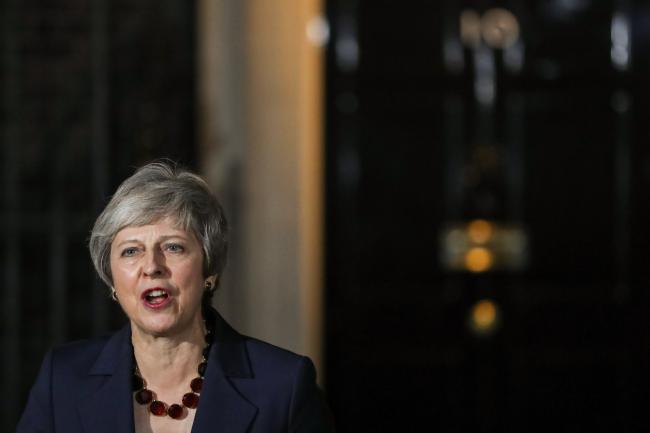(Bloomberg) -- Prime Minister Theresa May is fighting for her political life as a growing revolt from within her own party threatens to derail her Brexit plans and force the U.K. out of the European Union with no deal.
At least two senior ministers are said to be considering whether to quit, while scores of Conservative members of Parliament are lining up to vote against the accord that her cabinet grudgingly agreed to. There are even reports that a coordinated plot to oust May as U.K. leader is gathering pace.
While business and finance leaders are pleased that May has finally secured an agreement, their relief could be short-lived. The prime minister’s own team believe that the next few days will be the most perilous she’s encountered since becoming prime minister in the aftermath of the referendum vote to leave the EU in 2016. The pound was little changed in early Asia trading as investors await the big fight in Parliament.
Read more: City of London Is Far From Finishing Its Brexit Obstacle Course
In the two years since, she’s battled her party and the bloc’s 27 other countries to reach a fragile agreement on the terms of Brexit. On Wednesday, it was time for May finally to push her divided cabinet to sign up to the 585-page divorce deal. Next she must persuade a rebellious Parliament to follow suit and back her plan.
If politicians refuse to endorse the deal, when it comes to a vote in the next few weeks, they risk crashing the U.K. out of the bloc without a deal, or torpedoing Brexit altogether, she said.
The Brexit Divorce Deal: Champagne, Banks, Data and Trade
“The choice before us is clear,” May told reporters after a stormy cabinet meeting broke up after five hours. “This deal which delivers on the vote of the referendum, which brings back control of our money, laws and borders; ends free movement; protects jobs, security and our union -- or leave with no deal, or no Brexit at all.”
May emerged from the session late Wednesday to deliver her sober assessment, after a fraught meeting with her senior team.
Several people with knowledge of the matter said two cabinet ministers were reduced to tears during the meeting, which dragged on past its expected three-hour duration. Pensions Secretary Esther McVey is said to have demanded a formal vote among cabinet ministers on whether to accept or reject the plan. She was overruled by May’s officials and the government’s chief whip, and remained angry at the outcome, people familiar with the matter said.
McVey, and fellow cabinet ministers including Andrea Leadsom and Penny Mordaunt, have been weighing up whether they can stay in May’s government to see through the proposed terms of Brexit. Several people with knowledge of the matter believe it is still possible that at least one of them will quit in the days ahead.
One key issue has set these pro-Brexit ministers at odds with May: the plan for avoiding customs checks at the border between Ireland and Northern Ireland.
Read more: You Do the Math: Can May Get Her Brexit Deal Through Parliament?
May’s critics say this will keep the country in a potentially open-ended customs union with the EU. That’s unacceptable to Tory euroskeptics, who want the country to be free from EU rules so it can strike trade deals around the world.
Under the terms of the deal, the U.K. will enjoy a 21-month transition phase after Brexit takes place next March. During this period nothing will change, and businesses can carry on operating as now. To the dismay of pro-Brexit Tories, May’s deal contains the option of extending this transition period -- with no currently agreed end date to that extension. This, too, is designed to help avoid the need for customs checks at the Irish border.
Even if, as May’s team say, the backstop isn’t required, the outline agreement for the future trade relationship between the U.K. and the EU still suggests that deep ties will continue, keeping the country too close for many Tories’ comfort to the bloc’s single market and customs union.
While May could probably survive the loss of a few more ministers, she knows the bigger risk is still to come. She faces an onslaught from rank and file, euroskeptic Tories in Parliament after their leader, Jacob Rees-Mogg, said he couldn’t support her deal and urged his colleagues to reject it.
Some of Rees-Mogg’s allies are also said to be ready to send in formal letters demanding a vote of no confidence in May as their party leader, and prime minister, according to the BBC. Rees-Mogg said in an ITV (LON:ITV) interview late Wednesday that he hasn’t yet submitted a letter and that until now he’s disagreed with the policy rather than with May herself.
‘Their Responsibility’
“There comes a point at which the individual and the policy are so inextricably interlinked that that argument ceases to have any validity,” according to Rees-Mogg. “We are coming very close to that point,” he said, adding: "Let’s see what the prime minister says in her statement tomorrow."
If she survives for long enough, the EU is lining up a special summit of leaders to sign off the deal on Nov. 25. Speaking in Brussels shortly after the draft agreement was published, the EU’s chief Brexit negotiator, Michel Barnier, hailed the achievement and said they had been “extraordinary” negotiations.
He sidestepped the question of whether this was a “take-it or leave-it” offer to the U.K. but sent an implicit warning to British lawmakers who now must approve the deal. “Everybody on both sides has to take their responsibility,” he said.
On Thursday, May will make a statement to explain her deal to Parliament for the first time. Then, probably at some point in December, the House of Commons will be asked to vote finally on whether to accept it or not.
